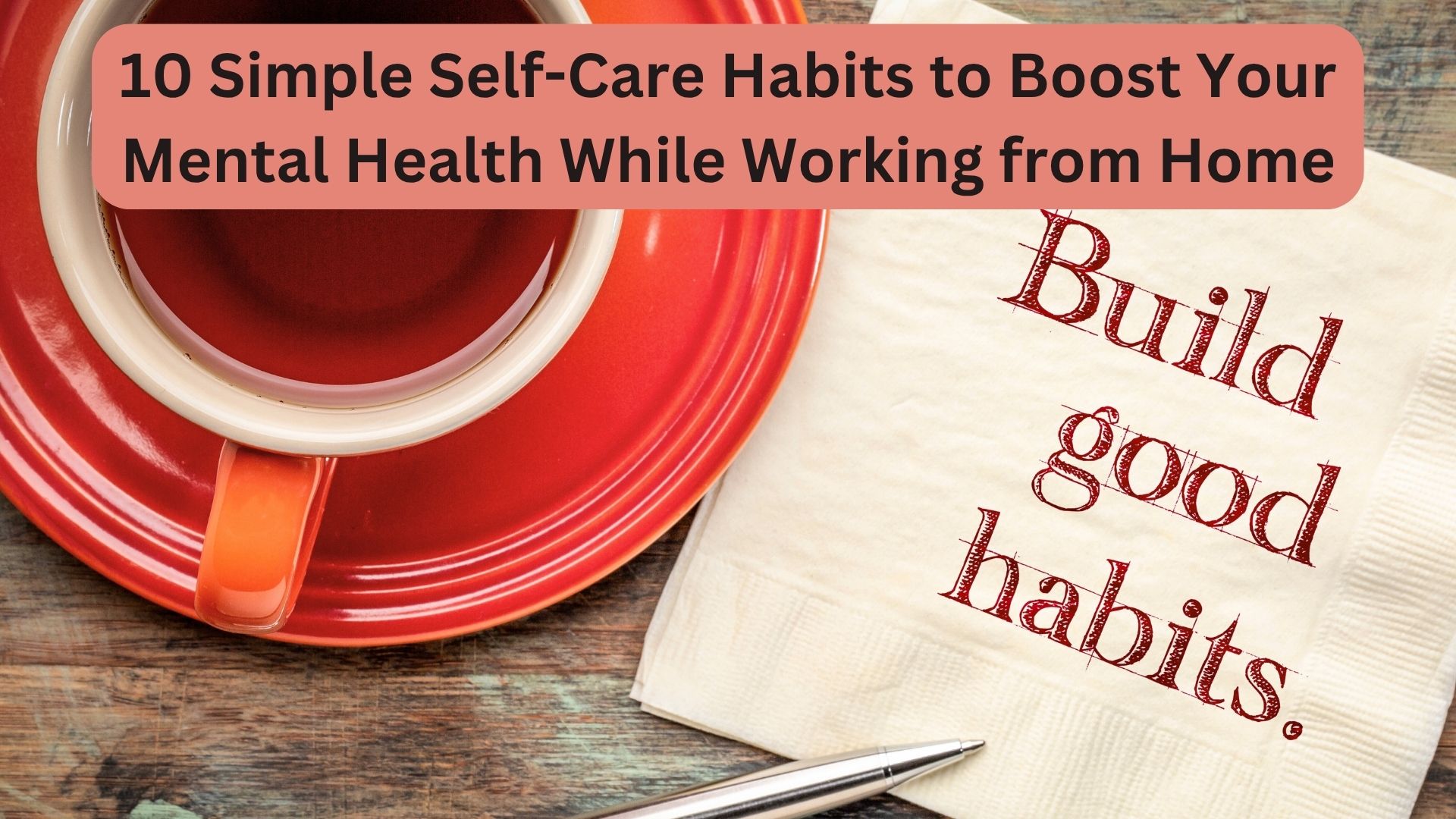Working from home comes with undeniable perks: no commute, more flexibility, and pajama-friendly mornings. But without the boundaries of a traditional workplace, many remote professionals find themselves overwhelmed, stressed, and mentally drained. Incorporating intentional self-care habits into your daily routine can dramatically improve your mental well-being, productivity, and overall satisfaction.
In this blog post, we’ll explore 10 simple yet powerful self-care habits tailored for remote workers who want to stay mentally strong, focused, and fulfilled.
1. Establish a Morning Routine That Grounds You
How you start your day sets the tone for everything that follows. Instead of jumping straight into work or scrolling on your phone, create a calming morning ritual that puts you in control.
| Activity | Benefit |
|---|---|
| Stretch or light workout | Boosts endorphins and energy |
| Journaling or gratitude list | Sets a positive mindset |
| Drinking water or herbal tea | Rehydrates after sleep |
| 10-minute meditation | Clears mental clutter |
A grounded morning routine can improve clarity, motivation, and emotional resilience.
2. Designate a Clear Work Space
Your environment shapes your state of mind. Working from your bed or couch might feel cozy but can blur the lines between work and rest. A dedicated workspace helps your brain switch into “focus mode.”
Tips:
- Use a desk and ergonomic chair if possible
- Keep the area clean, clutter-free, and well-lit
- Add something that makes you smile (plants, art, a quote)
When work has a “home,” so does your downtime.
3. Stick to a Consistent Work Schedule
One of the biggest threats to mental health in remote work is overworking or working erratic hours. Setting clear start and stop times not only protects your personal time but also signals your brain when it’s time to rest.
| Time Block | Task |
| 9:00 AM – 12:00 PM | Deep work / major tasks |
| 12:00 PM – 1:00 PM | Lunch break (away from screen) |
| 1:00 PM – 3:00 PM | Meetings / communication |
| 3:00 PM – 5:00 PM | Admin, wrap-up tasks |
Stick to your hours and communicate boundaries clearly to clients or team members.
4. Schedule Regular Movement Breaks
Sitting all day affects your physical and mental health. Movement isn’t just good for your body—it refreshes your brain, reduces stress, and improves focus.
Ideas:
- Set a timer every hour to stretch
- Try a 15-minute walk or yoga session midday
- Use a standing desk or sit-stand converter
- Follow a YouTube fitness or dance video during breaks
5. Eat Nourishing Meals (And Actually Take a Lunch Break)
When you’re busy at home, it’s easy to skip meals or snack mindlessly. Balanced meals stabilize your mood and energy levels.
Quick Lunch Ideas:
- Grain bowl with veggies and protein
- Smoothie with fruit, greens, and healthy fat
- Soup + whole grain toast combo
- Hummus, pita, and fresh veggie platter
Step away from your desk during meals. Enjoying your food mindfully is part of self-care.
6. Limit Screen Time After Work Hours
Too much screen time, especially before bed, contributes to anxiety, eye strain, and poor sleep. Create a digital wind-down routine:
- Turn off work notifications after hours
- Avoid phone scrolling in bed
- Try reading a book, doing a puzzle, or listening to music
Consider using blue light filters or screen time trackers to help.
7. Stay Social (Even If Virtually)
Loneliness is a silent stressor for many remote workers. Make connection part of your routine:
| Method | Frequency |
| Virtual coffee chats | Weekly |
| Online networking events | Monthly |
| Check-in with family or friends | Every few days |
| Join an interest-based community | Ongoing |
Even brief conversations can significantly lift your mood.
8. Practice Mindfulness or Meditation
Mindfulness helps you stay present and respond thoughtfully instead of reacting emotionally. It’s proven to lower anxiety and increase focus.
Try This:
- 5-minute breathing exercises (box breathing, 4-7-8 method)
- Use apps like Calm, Headspace, or Insight Timer
- Do a quick body scan at your desk
Just a few minutes daily can have lasting effects.
9. Celebrate Small Wins
Without a boss nearby or office kudos, it’s easy to overlook your accomplishments. Create your own system to recognize progress.
| Achievement | Celebrate With |
| Finished a big task | A walk outside or favorite snack |
| Positive client feedback | Share it with a friend or journal it |
| Hit weekly goals | Take Friday afternoon off |
Celebrating boosts dopamine and keeps motivation high.
10. Know When to Rest—and Actually Rest
Pushing through fatigue leads to burnout. Listen to your body and mind.
Signs You Need a Break:
- Trouble focusing on simple tasks
- Snapping at people easily
- Physical tension or headaches
Take a mental health day if needed. Sleep in. Say no to extra tasks. Your work—and your mind—will thank you.
Final Thoughts
Taking care of yourself isn’t a luxury—it’s a requirement for thriving as a remote professional. By building self-care into your daily routine, you’re not just protecting your mental health—you’re becoming more focused, creative, and resilient.







Leave a Reply